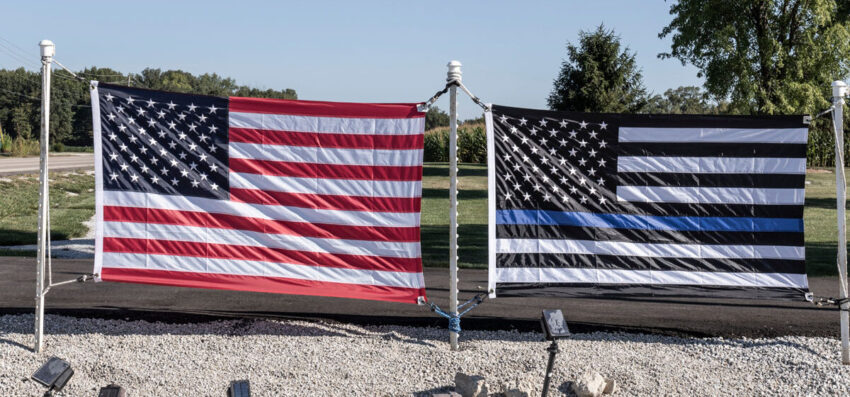Disclaimer: Any opinions expressed in the following article belong solely to the author and do not reflect or represent Newsner.
It’s a symbol meant to unite, yet almost since its inception it has divided citizens and even law enforcement, the very people it’s supposed to support. It’s time we get rid of the Thin Blue Line flag.
Originally, the flag was meant to honor law enforcement officers, symbolizing their role as protectors standing between chaos and order. The Thin Blue Line flag was often interpreted as a symbol of solidarity with the police. However, over time, it has taken on different connotations.
In order to show continued support for law enforcement, we need to abandon the current flag and find a new design.
It’s unclear when the first Thin Blue Line flag was created, but the term “thin blue line” was first recorded in 1911 to refer to police by New York police commissioner Richard Enright. During the 1960s and 1970s, the phrase began to spread across police departments throughout the United States.
According to The Marshall Project, Andrew Jacob was watching the 2014 protests of police killings of Eric Garner, Michael Brown, and Tamir Rice when he first spotted images of the Thin Blue Line flag on stickers.
Although Jacob claims the flag wasn’t the result of the Blue Lives Matter movement, the group quickly adopted the new flag. While a previous version used by law enforcement supporters throughout Europe and Australia already existed, Jacob wanted one specific to the United States.
“The flag has no association with racism, hatred, bigotry,” he said. “It’s a flag to show support for law enforcement—no politics involved.”
Except the Thin Blue Line flag has become extremely divisive and political.

Originally meant to fly in support of law enforcement officers, the flag has become associated with white supremacists.
While Jacob built his business, the Blue Lives Matter movement took off, and the Thin Blue Line flag quickly became a part of police culture. However, previous comments from former President Donald Trump, then a presidential candidate, led many to believe the police were “the force between civilization and total chaos.”
“It fosters this ‘us versus them’ mentality,” Michael White, a professor of criminology at Arizona State University said. “The police and community together should work together, in order to produce safety. Each should respect the role of the other. If you’re looking at the community as a potential enemy, or a threat, that’s certainly going to hinder any positive relationship.”
#Charlottesville pic.twitter.com/ieuCPNiTd5— Christopher Mathias (@letsgomathias) August 12, 2017
In 2017, the flag was seen flying high above the Unite the Right rally in Charlottesville, Virginia alongside Confederate flags carried by neo-Nazis. Thin Blue Line USA, Jacob’s business, condemned the act, but it made little difference.
“We reject, in the strongest possible terms, any association of our flag with racism, hatred, and bigotry,” the company said in a statement. “To use it in such a way tarnishes what it and our nation believe in. The thin blue line flag stands for the sacrifice law enforcement officers of this nation make each day. We ask our nation to hold faith with those that defend the thin blue line.”
The flag would continue to be flown by white supremacists and cause issues for cities across the United States–most notably on January 6, 2021.
How could any flag associated with the attack on the Capitol Building remain linked to a good cause?

It’s time we wave the white flag and start over. While the Thin Blue Line flag was initially a symbol of support for law enforcement, it has become a source of division, co-opted by extremist groups and tainted by its association with controversial events. Despite efforts to distance the flag from these negative connotations, its role in fostering an “us versus them” mentality has made it more polarizing than unifying.
To truly honor law enforcement and rebuild trust between police and communities, it is time to retire the Thin Blue Line flag and create a new symbol that represents solidarity and justice without the baggage of its current associations.

